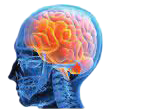Understanding and Managing Long COVID Brain Fog: Latest Research and Strategies
What Is Brain Fog?
Brain fog is one of the most common problems people experience after having COVID-19. Research shows it affects between 20-25% of Long COVID patients. Brain fog makes it difficult to think clearly, remember things, and focus on tasks. When you have brain fog, your brain works more slowly than usual, making everyday activities harder to complete.
The Science Behind Brain Fog
Recent research has identified several reasons why brain fog happens after COVID-19:
A 2023 study in Nature Medicine found that COVID-19 can trigger inflammation that affects small blood vessels in the brain, reducing blood flow to important areas responsible for memory and thinking. Scientists at Yale discovered evidence of brain inflammation persisting for months after infection, affecting communication between brain cells.
Research published in Cell in 2024 found that some COVID-19 patients develop autoantibodies—immune proteins that mistakenly attack healthy brain tissue. This may explain why cognitive symptoms can last long after the viral infection is gone.
Evidence-Based Management Strategies
Address Fatigue
Your brain uses about 20% of your body's energy despite being only 2% of your body weight. A 2022 study in Frontiers in Neurology found that improving energy metabolism helped reduce cognitive symptoms in Long COVID patients. Medical tests to check for thyroid problems, vitamin deficiencies, or sleep disorders are important. Research shows that treating these underlying conditions often improves brain fog symptoms.
Try Gentle Exercise
A clinical trial published in Brain, Behavior, and Immunity showed that just 15 minutes of light physical activity increased cerebral blood flow by up to 15%. This delivers more oxygen and nutrients to brain cells. However, researchers caution against overexertion. A 2023 study found that 89% of Long COVID patients experienced symptom flares after excessive activity. The key is finding the right balance—enough to improve blood flow without triggering post-exertional malaise.
Optimize Sleep Quality
During deep sleep, your brain activates its glymphatic system—a waste clearance process discovered by researchers at the University of Rochester. This system removes inflammatory proteins that accumulate during the day. A 2021 sleep study showed that Long COVID patients with improved sleep quality reported a 40% reduction in cognitive symptoms within eight weeks.
Eat Brain-Healthy Foods
The Mediterranean diet has shown particular promise for cognitive recovery. A 2023 clinical trial found that patients following this diet experienced greater improvements in cognitive function compared to those on standard diets. Foods rich in omega-3 fatty acids help brain cells communicate better. Research from the University of Illinois found that increasing omega-3 intake improved working memory in patients recovering from viral illnesses.
Manage Stress
Ongoing stress raises cortisol levels, which can damage the hippocampus—the part of your brain responsible for forming memories. A 2022 study in Biological Psychiatry showed that stress reduction techniques like mindfulness meditation reduced inflammation markers associated with cognitive difficulties. Activities such as biofeedback and yoga can also be beneficial.
Consider Emerging Treatments
A 2023 study published in Cell Reports Medicine tested the combination of N-acetylcysteine (NAC) and guanfacine in 40 Long COVID patients with severe cognitive symptoms. After 12 weeks, 76% showed significant improvements in attention, memory, and processing speed. Another promising treatment involves low-dose naltrexone, which has anti-inflammatory properties. A small pilot study found that 62% of Long COVID patients reported improved cognitive function after two months of treatment.
Recovery Timeline
Research from Mount Sinai's Center for Post-COVID Care shows that cognitive recovery usually follows a non-linear pattern. Most patients see gradual improvement over 6-12 months, though some symptoms may persist longer. A large-scale study tracking over 2,000 Long COVID patients found that 67% reported significant improvement in cognitive symptoms by the 18-month mark, offering hope that recovery is possible for most people.
The Importance of Comprehensive Care
Studies consistently show that patients who receive multidisciplinary care—combining medical treatment, cognitive rehabilitation, and lifestyle modifications—have better outcomes than those using single approaches.
About the Author: Dr. Susan Borgaro is a Clinical Neuropsychologist specializing in memory assessment and cognitive enhancement strategies. With over 25 years of experience working with patients across the lifespan, Dr. Borgaro brings both clinical expertise and practical insights to help people optimize their cognitive functioning. www.nasarizona.com

